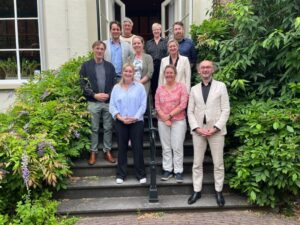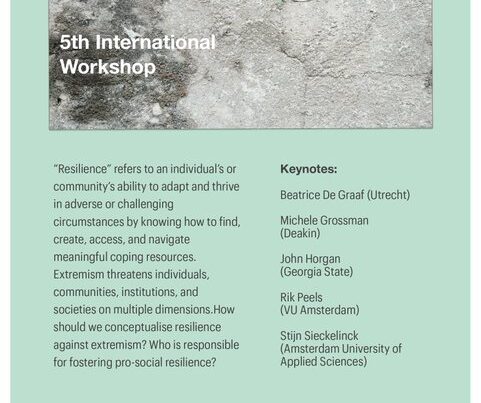Some communities drifted apart during the corona pandemic, while others survived. What exactly is this about? The Adapt! team will investigate this, thanks to receiving the prestigious Gravitation grant of 23 million euros from the Netherlands Organization for Scientific Research (NWO). “During the pandemic it became clear that the core values of open societies, such as freedom, equality and solidarity, could be eroded,” says Adapt! leader and historian Beatrice de Graaf (Utrecht University). “We want to know how to prevent that and how as a society you can respond better to a crisis.”
In the Adapt Academy, researchers from five universities will work together in the Adapt! team: Beatrice de Graaf, Lotte Jensen, Ellen Giebels, Arjen Boin, Paul van Lange, Kees vd Bos, and Rik Peels. They will study for the next 10 years how societies can adapt to crises of violent extremism, pandemics, and natural disasters.together to gather more knowledge and expertise about the adaptability of societies in times of crisis.

Pandemics, terrorism, and climate emergencies endanger not just safety and prosperity but also the core values of open societies – values such as civil liberties, equal opportunity, open enquiry, and solidarity. The Covid-19 pandemic has demonstrated how quickly even rich and well-organised societies can succumb to a disruptive force coming seemingly out of nowhere.
Human societies have always faced critical episodes, but the growing frequency, magnitude, and costs of disasters and other emergencies are highly concerning. Societies have to prepare for more crisis-prone times. Open societies must learn to live through major disruptions without descending into dysfunctional conflicts about core values and identities. Recent crisis experiences have shown that preserving societal values in times of crisis requires more than having enough economic, technological, or medical resources. For a successful crisis response, societies must also draw on their cultural, social, and governance capabilities.
There is an urgent need for evidence-based insights that help societies to weather a crisis while protecting the core values of the open society. The Adapt! programme will radically advance the current state of the art with regard to knowledge, insights, tools, and strategies that boost the ability of citizens, frontline professionals, and policymakers to collectively weather crises. It will focus on three types of crises: pandemic-related crises, crises resulting from violent extremism, and natural disasters such as floods and earthquakes. Our distinctive contribution is to focus on the societal dimension of crisis response. This has been identified as a critical yet under-researched differentiator and a key area for understanding how communities may strengthen their ability to successfully deal with future crises.
The Adapt! Programme has two goals. The first goal is to identify the determinants of successful societal crisis responses. We will focus on the time period between 1800 and the present. This long-term perspective helps to identify a wide range of explanations for successful crisis responses. Through careful historical research and analysis of the behaviour of individuals, groups, and communities, and intensive collaborations with citizens, frontline professionals, and policymakers, we will identify, unpack, and road-test interventions that boost the cultural, social, and governance capabilities of communities to respond to a crisis. The core aim is thus to produce contextually and historically grounded, actionable, and usable knowledge about the way societies can respond to crises.
The second goal of Adapt! is to create a permanent, open, international, and interdisciplinary infrastructure for studying, designing, and implementing strategies that enable social systems to respond to large disruptions. This goal will be served by the Adapt Academy. This research infrastructure combines knowledge from the humanities with expertise from the social sciences. It facilitates and brings together basic and applied research, theoretical and experimental research, and longitudinal intervention and evaluation programmes. Importantly, this infrastructure will provide a permanent interface for doing applied research and for co-designing research agendas with local communities, frontline professionals, and policymakers, while directly making all the generated data available to scholars all over the world. The Adapt Academy will become an international centre for the study of societal adaptation in the academic domain, drawing in talent and peer collaborations from around the world through joint studies, fellowships, and conferences. We will build upon our expertise in policy-relevant engagement to tie international, national, and local governments and large non-governmental organisations to the programme. Adapt! is designed to have a lasting impact. We will identify and nurture a new generation of practice-oriented scholars. We will train them to conduct peer-to-peer and science-to-society research and interventions, which will allow them to bridge the perennial gap between academic research and the world of practice. We will build a stable base for lasting institutional development, positioning Adapt! in the heart of the crisis field and closely aligning it with European and nonEuropean centres of excellence. This permanent infrastructure for research and impact in and between the academic, institutional, and community domains will enable the co-production of knowledge that is so urgently needed by social systems to adapt smartly, effectively, and legitimately in the face of emerging disruptions.


